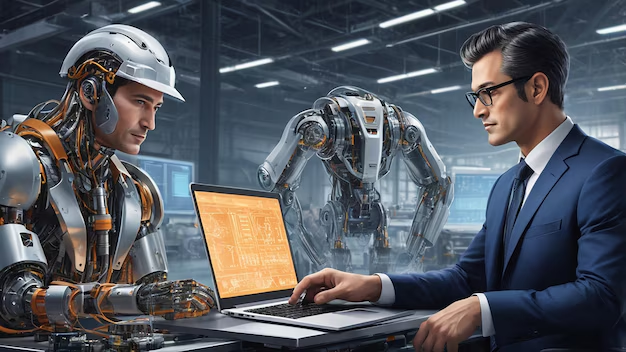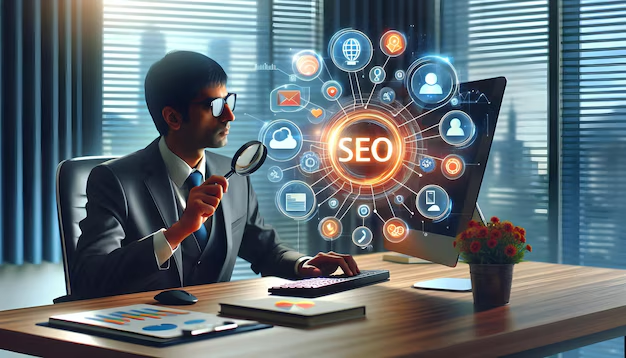Technological Advances in AI and Automation: Transforming Industries and Shaping the Future

Technological Advances in AI and Automation: Transforming Industries and Shaping the Future
Artificial intelligence and automation have evolved at an extremely fast pace over the last few years. So far, these evolution processes have transformed industries, the way businesses work, and the way people live. These revolutionized technologies cut across various sectors—from healthcare to manufacturing—to unlock new potentialities, improve efficiencies, and change our daily lives. This is an article on the latest AI and automation advancements and their huge impacts on different sectors.
1. What is artificial intelligence (AI)?
Artificial intelligence is a field of computer science that develops machines simulating human intelligence. AI systems, on the other hand, rely on algorithms that can accomplish tasks such as decision-making, problem-solving, and learning through data. The last few years have witnessed an immense improvement due to adaptation in processing large amounts of datasets and predicting the outcome.
1.1 Narrow AI
Narrow AI refers to an AI developed for a specific application or task, such as voice recognition.
General AI: The long-term vision that AI can do anything intellectual that a human being can ever do.
Superintelligence: theoretical AI is more intelligent than the combined human brain.
2. Role of Automation
Automation is the use of technology to perform tasks with minimal human intervention. From robotics in manufacturing to AI-driven software in customer service, automation increases efficiency in repeating boring or hazardous jobs.
3. AI in Healthcare
Health is one of the domains with improvements at their most significant levels, brought about by AI. AI-based technologies are improving patient outcomes, developing more complex research, and diagnosing diseases much faster.
3.1 AI for Diagnostics
AI algorithms can scan all types of medical images, such as X-rays or MRIs, more rapidly than a human doctor. Such systems can identify imperfections earlier; hence, this opens windows of possibility for patients to be treated on time.
3.2 Personalized Medicine
It also enables personalized treatment plans for the patients by scrutinizing their medical history, genetics, and lifestyle, which can be followed in a productive way.
3.3 AI-Assisted Discovery of Drugs
Pharmaceutical companies employ AI in drug discovery rapidly. The AI-achieved forecasted behavior of various molecules enables one to save time and the related cost that is associated with the development of drugs.
4. Manufacturing Automation
Automation is changing the manufacturing industry through increases in productivity, reductions in costs, and adherence to improved safety standards. Its importance is seen in the increased presence of robots, AI-controlled equipment, and automated manufacturing lines.
4.1 Industrial Robots
Manufacturing robots in the industry perform rigid operations at speeds that are efficient and safe. In an assembly line, human error is reduced and production increases with the presence of the machines.
4.2 Smart Factories
This allows for “smart factories” powered with IoT and AI to ensure that the machines can communicate with each other, automatically optimize production processes, and reduce downtime.
4.3 3D Printing and Automation
Automation has teamed up with 3D printing technology to make prototypes and product creations more effective. The blend has proven to be extremely beneficial to aerospace and automotive manufacturing.
5. AI in Retail
In the retail sector, major changes through AI include online shopping experiences and inventory management.
5.1 Personalized Shopping
The retailers utilize AI in offering the convenience of fabulous customer experiences through personalized recommendations. Here, AI algorithms process the consumer data to identify the patterns and predict consumer preferences for products, increasing engagement with the customer and subsequent sales.
5.2 Automatic Inventory Management
The AI-powered systems tend to be pretty useful in managing the inventory of products on sale at retailer stores. It predicts the demand for products and facilitates automation of the restocking of goods, which reduces overstocking and empty shelves, thus enhancing the business processes’ efficiency.
6. Self-drive cars. The Future of Driving
AI lies at the heart of self-drive car technology. Self-driving cars apply AI to navigate through roads, avoid obstacles, and ensure safe transport for their occupants.
6.1 How AI Makes Self-Drive Cars Work
Autonomous vehicles utilize sensors, machine learning, and real-time data processing to decide on whether to brake, accelerate, or steer.
6.2 Consequences of Transportation Automation
Beyond self-driving cars, AI and automation are also transforming the world of logistics and supply chain management. Automated vehicles, drones, and robotics enable greater efficiency in delivery while saving money in labor and greatly reducing the possibility of human error.
7. AI in Finance
AI is transforming the financial services sector, particularly in areas such as fraud detection, customer service, and investment management.
7.1 Fraud Detection
The AI algorithms are very effective in detecting fraud in transactions with the help of pattern analysis of financial transactions. This helps banks and other financial establishments prevent and react to fraud much more quickly than they were ever able to do before.
7.2 Robo-Advisors
The Robo-advisors refer to the automated investment platforms that use AI to optimize and manage portfolios for investment. These places make financial advice much more accessible and affordable for investors who are individual investors.
8. AI-Powered Virtual Assistants
From phones to home appliances, these AI-based applications like Siri, Alexa, and Google Assistant have found a space in our personal lives. They take voice commands, perform routine tasks, and even control smart home devices.
8.1 Natural Language Processing (NLP)
The innovation behind the technology of virtual assistants, Natural Language Processing (NLP), has become the field with tremendous pace of improvement. It lets machines develop an understanding and subsequently converse in human language, thus making the interaction with AI smoother and more intuitive.
8.2 Virtual Assistants at Work:
AI assistants are far beyond the scope of personal assistants. The new businesses also use it for calendaring, reminders, and handling customer questions so that the working forces can focus on more valuable work while relieving administrative burdens.
9. AI and Automation in Education
Applying AI has even changed education, making it more customized and automatic routine administrative tasks.
9.1 Personalized Learning
AI-based learning platforms can be adaptive to the needs of students while providing relevant lessons, quizzes, and immediate feedback. In this way, learning will be more relevant and impactful.
9.2 Automating the Routine Tasks
While improving learning, AI has also been able to free educators from routine chores such as assessment, scheduling, and even recording student data by enabling the teacher to focus on more teaching.
10. Ethical Issues and Challenges of AI
With these advancements in technologies, AI, and automation, ethical questions come forth concerning job displacement, privacy, and decision-making.
10.1 Job Impact
Where the biggest concern lies is in workers being displaced due to the automation of these processes, especially in manufacturing and retail. Such efficiency boosts within those automated sectors cannot help but cast a shadow over future jobs, though.
10.2 Privacy and Data Security
AI greatly depends on data, which raises issues of privacy and security. With information collection and subsequent processing by an AI system for highly personal data, proper regulation that safeguards the privacy of the individual is necessary.
Conclusion
The breakthroughs of technology are defining industries and redefining how we will live and work. They alter the healthcare, manufacture, retail, and finance patterns to drive more efficiency, innovation, and fresh possibilities for individuals in every sphere. AI and automation deliver tremendous benefits but raise ethical and societal concerns as they march forward.
FAQs
What is the role of AI in healthcare?
AI helps improve diagnostics, enables treatment tailored to individual needs, and accelerates drug discovery in healthcare.
How is automation impacting the manufacturing sector?
Automation increases productivity, reduces costs, and improves safety in manufacturing through the use of industrial robots and smart factories.
What are some of the ethical impacts of AI?
Job displacement because automation contributes to further job losses tops the list in terms of ethics but also raises concerns over privacy and data security with the advent of AI.
How do autonomous vehicles use AI?
AI is the backbone of self-driving cars because they make use of sensors to detect and technology in machine learning to find their paths to avoiding obstacles and for safe driving.
What’s in the store with AI-enabled virtual assistants?
Advanced virtual assistants with more advanced natural language processing enable virtual assistants to be more efficient in performing tasks and handling smart devices.



